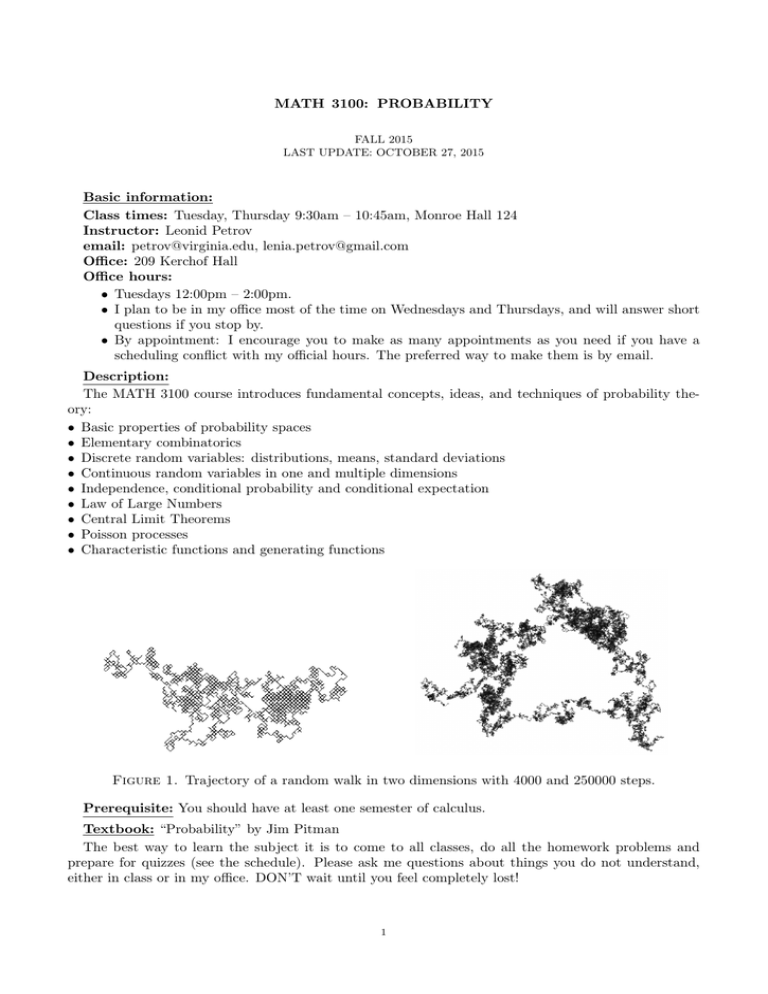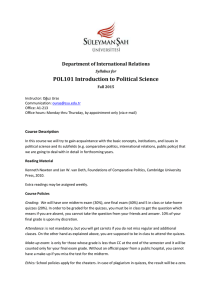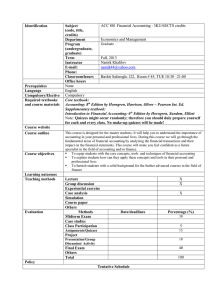MATH 3100: PROBABILITY Basic information:
advertisement

MATH 3100: PROBABILITY FALL 2015 LAST UPDATE: OCTOBER 27, 2015 Basic information: Class times: Tuesday, Thursday 9:30am – 10:45am, Monroe Hall 124 Instructor: Leonid Petrov email: petrov@virginia.edu, lenia.petrov@gmail.com Office: 209 Kerchof Hall Office hours: • Tuesdays 12:00pm – 2:00pm. • I plan to be in my office most of the time on Wednesdays and Thursdays, and will answer short questions if you stop by. • By appointment: I encourage you to make as many appointments as you need if you have a scheduling conflict with my official hours. The preferred way to make them is by email. Description: The MATH 3100 course introduces fundamental concepts, ideas, and techniques of probability theory: • Basic properties of probability spaces • Elementary combinatorics • Discrete random variables: distributions, means, standard deviations • Continuous random variables in one and multiple dimensions • Independence, conditional probability and conditional expectation • Law of Large Numbers • Central Limit Theorems • Poisson processes • Characteristic functions and generating functions Figure 1. Trajectory of a random walk in two dimensions with 4000 and 250000 steps. Prerequisite: You should have at least one semester of calculus. Textbook: “Probability” by Jim Pitman The best way to learn the subject it is to come to all classes, do all the homework problems and prepare for quizzes (see the schedule). Please ask me questions about things you do not understand, either in class or in my office. DON’T wait until you feel completely lost! 1 2 Students are strongly encouraged to read the textbook. It includes many examples and extra exercises which augment the concepts discussed in the course. However, the textbook contains much more material than will be covered in classes, so it makes sense to come to all classes and see which parts of the textbook are actually covered. Grading: Homeworks will be assigned each week, and will be collected. Some of them will be graded (this will be announced while assigning the homework). There will be several in-class quizzes (see the schedule), a midterm and a final exam. Quizzes are 20-25 minute in-class exams based on assigned problems from homework. Grade distribution: 35% quizzes + homeworks + class participation 30% midterm exam 35% final exam * class participation mostly means ungraded homeworks and attendance Approximate course schedule: week 1. 8/25, 8/27 — §§1.1, 1.3 week 2. 9/1, 9/3 — §§1.4, 1.5, 1.6 week 3. 9/8, 9/10 — §§2.1, 2.2, 2.4 week 4. 9/15, 9/17 — §§2.5, 3.1 week 5. 9/22, 9/24 — §§3.2, 3.3 week 6. 9/29, 10/1 — §3.4 week 7. 10/8 — §3.5 week 8. 10/13, 10/15 — §4.1 week 9. 10/20, 10/22 — §4.2 week 10. 10/27, 10/29 — §4.4 week 11. 11/3, 11/5 — §§4.5, 5.1 week 12. 11/10, 11/12 — §§5.2, 5.3 week 13. 11/17, 11/19 — §§6.1, 6.2 week 14. 11/24 — §6.3 week 15. 12/1, 12/3 — §6.4 week 16. 12/8 — §6.5 Add/drop information: http://www.virginia. edu/registrar/reginst1158.html#Deadlines Quizzes (approximately): 9/3, 9/17, 10/1, 10/29, 11/12, 11/19, 12/3 Midterm exam: tentatively scheduled for 10/15 Final exam: Friday, December 18, 2:00pm5:00pm, same room as the class Do not make travel plans that conflict with either midterm or final exam! Collaboration, independent work, honor code: You are encouraged to work together to learn material and prepare for quizzes. Teams of two work very well. Most mathematicians work in pairs to take advantage of the challenge-defend discussions that help us understand things better. Of course, some learning will also require independent work, such as reading assignments and doing practice problems. You are required to work independently on the quizzes. So when working together with others, make sure you are preparing yourself to take the quiz independently. The honor code is taken seriously. Any honor code violations pertaining to the quizzes will be automatically referred to the Honor Committee. Additional course support: The Math Department Tutoring Center is available for helping students in this course: see http://people.virginia.edu/~psb7p/MTCsch.html for more information and schedule. Special needs accommodations: All students with special needs requiring accommodations should present the appropriate paperwork from the Student Disability Access Center (SDAC). It is the student’s responsibility to present this paperwork in a timely fashion and follow up with the instructor about the accommodations being offered. Accommodations for test-taking (e.g., extended time) should be arranged at least 5 business days before an exam.

